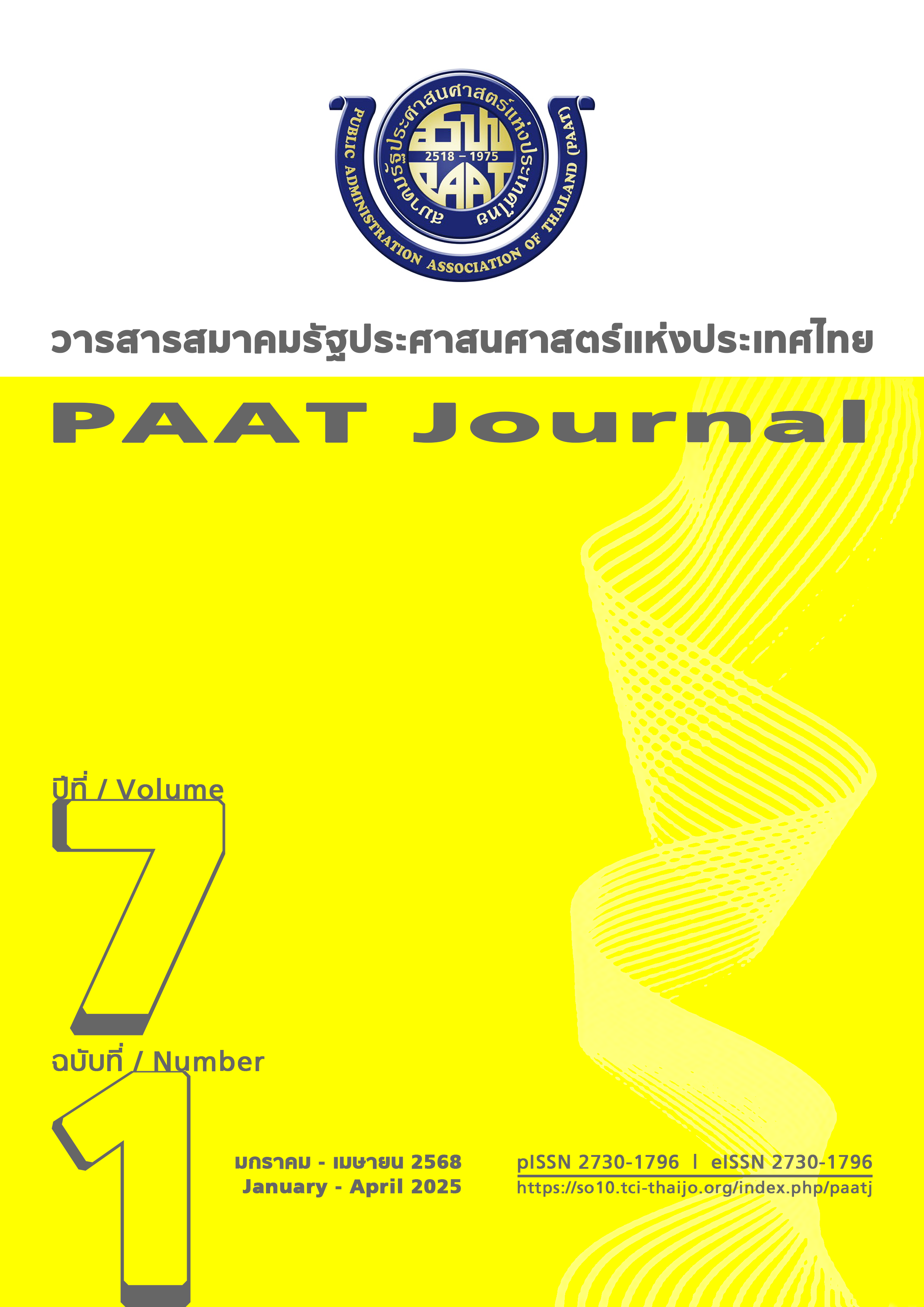Factors Affecting Digital Citizenship of Generation Z in Thailand: A Systematic Review
Keywords:
Digital Citizen, Generation Z, A Systematic Review, Perceived Self-efficacyAbstract
This research aims to synthesize the factors that affect digital citizenship among Generation Z in Thailand by applying a systematic review. The studies that were included in this research were sourced from TCI and ThaiLIS databases between 2015 and 2024. The selection criteria focused on studies that related to digital citizenship among Generation Z in Thailand. Keywords, abstracts, titles, criteria, and methodologies of the selected studies were thoroughly considered. The research instruments consisted of (1) a research screening form, (2) a quality assessment form, and (3) a data extraction form. A qualitative research method was employed for data analysis. Through consultation with three experts, 275 studies were identified. Lastly, there were four studies that met the qualification criteria. The result of the study revealed seven factors that influence digital citizenship in Thailand: (1) attitudes, (2) behavioral intention, (3) digital responsible behavior, (4) expectancy, (5) facilitating conditions, (6) perceived self-efficacy, and (7) learning achievement. The government or related agencies should promote and enhance all seven factors to support Generation Z in achieving higher digital citizenship in response to the government's digital government policy.
References
สำนักงานพัฒนารัฐบาลดิจิทัล (องค์การมหาชน). (2566). แผนพัฒนารัฐบาลดิจิทัลของประเทศไทย พ.ศ. 2566-2570. https://www.dga.or.th/
Ribble, M. (2015). Digital citizenship in schools: Nine elements all students should know (3rd ed.). International Society for Technology in Education.
กระทรวงดิจิทัลเพื่อเศรษฐกิจและสังคม (2565). รายงานผลการสำรวจพฤติกรรมผู้ใช้อินเทอร์เน็ตในประเทศไทยปี 2565. http://www.etda.or.th/getattachment/78750426-4a58-4c36-85d3-d1c11c3db1f3/IUB-65-Final.pdf.aspx
Lu, C. & Gu, M. M. (2024). A systematic review and meta-analysis of factors and outcomes of digital citizenship among adolescents. Asia Pacific Journal of Education, (04), 1-16. https://doi.org/10.1080/02188791.2023.2296352
Al-Ali, A., Alsmairat, M., Qawasmeh, R., Mahrakani, N. & Alhazzani, N. (2024). Exploring the role of digital citizenship and digital empowerment to enhance academic erformance of business students. International Journal of Data and Network Science, 8(2), 1275-1284.
Ruenphongphun, P., Sukkamart, A. & Pimdee, P. (2022). Developing Thai undergraduate online digital citizenship skills (DCS) under the New Normal. Journal of Higher Education Theory and Practice, 22(9), 370-385. https://doi.org/10.18844/wjet.v13i3.5937
Jamal, B. & Rizvi, S. (2023). Analysis of the Digital Citizenship Practices among University Students in Pakistan. Pakistan Journal of Distance & Online Learning, 9(1), 50-68. http://doi.org/10.30971/pjdol.v9i1.1399
ธัญธัช วิภัติภูมิประเทศ. (2567). ทักษะการเป็นพลเมืองดิจิทัลของนักศึกษาระดับปริญญาตรี. วารสารมนุษยศาสตร์และสังคมศาสตร์ มหาวิทยาลัยมหาสารคาม, 43(1), 43-53.
รยากร สุวรรณ์, สุริยจรัส เตชะตันมีนสกุล, ธรรมพร ตันตรา และสถาพร แสงสุโพธิ์ (2566). การศึกษาคุณสมบัติการเป็นพลเมืองดิจิทัลของสมาชิกสภาเยาวชน อำเภอแม่แตง จังหวัดเชียงใหม่. วารสารวิชาการวิทยาลัยบริหารศาสตร์, 6(2), 1-16.
ชูชิต ชายทวีป, พิศณี พรหมเทพ และธนิษฐา สมัย. (2565). ทักษะความเป็นพลเมืองดิจิทัลของนักศึกษาในสถาบันอุดมศึกษาเอกชน. วารสารวิชาการมหาวิทยาลัยราชภัฏศรีสะเกษ, 16(3), 147-156.
Mahadir, N. B., Baharudin, N. H. & Ibrahim, N. N. (2021). Digital Citizenship Skills among Undergraduate Students in Malaysia: A Preliminary Study. International Journal of Evaluation and Research in Education, 10(3), 835-844.
Suphattanakul, O., Maliwan, E., Eiamnate, N., & Thadee, W. (2023). Developing Digital Citizenship in Municipality: Factors and Barriers. International Journal of Sustainable Development & Planning, 18(5). 1499-1505.
จุไรรัตน์ ทองคำชื่นวิวัฒน์. (2564). ความสัมพันธ์ระหว่างทักษะความฉลาดทางดิจิทัลกับพฤติกรรมการเป็นพลเมืองดิจิทัลของเยาวชนไทยใน กรุงเทพมหานคร. วารสารนิเทศศาสตร์ปริทัศน์, 25(3), 232-243.
ปาจรีย์ ติ้วสิขเรศ และศรันย์ พิมพ์ทอง. (2566). รูปแบบความสัมพันธ์เชิงสาเหตุของพฤติกรรมการเป็นพลเมืองดิจิทัลของนักศึกษาระดับปริญญาตรี มหาวิทยาลัยราชภัฏ. วารสารหาดใหญ่วิชาการ, 22(2), 364-387.
Joanna Briggs Institute. Joanna Briggs Institute Reviewers’ Manual: 2014 edition. The Joanna Briggs Institute. http://www.joannabriggs.org/sumari.html.
Ke, D. & Xu, S. (2017). A Research on factors affecting college students' digital citizenship. In 2017 International Conference of Educational Innovation through Technology (EITT) (pp. 61-64). IEEE.
สร้อยตระกูล (ติวยานนท์) อรรถมานะ. (2541). พฤติกรรมองค์การ : ทฤษฎีและการประยุกต์. สำนักพิมพ์มหาวิทยาลัยธรรมศาสตร์.
Al-Zahrani, A. (2015). Toward digital citizenship: examining factors affecting participation and involvement in the Internet society among higher education students. International Education Studies, 8(12), 203-217.
Venkatesh, V., Morris, M. G., Davis, G. B. & Davis, F. D. (2003). User acceptance of information technology: Toward a unified view. MIS quarterly, 27(3), 425-478.
Engotoit, B., Kituyi, G.M. & Moya, M. B. (2016). Influence of performance expectancy on commercial farmers’ intention to use mobile-based communication technologies for agricultural market information dissemination in Uganda. Journal of Systems and Information Technology, 18(4), 346-363. https://doi.org/10.1108/JSIT-06-2016-0037
Bandura, A. & Wessels, S. (1997). Self-efficacy. Cambridge University Press.
วรพจน์ วงศ์กิจรุ่งเรือง. (2561). คู่มือพลเมืองดิจิทัล. สำนักงานส่งเสริมเศรษฐกิจดิจิทัล กระทรวงดิจิทัลเพื่อเศรษฐกิจและสังคม. https://thaidigizen.com/wpcontent/uploads/2018/06/DigitalCitizenship-Book-ok.pdf
Dunaway, M. & Macharia, M. (2021). The effect of digital citizenship on negative online behaviors and learning outcomes in higher education. Journal of Information Systems Education, 32(4), 294-307.
Downloads
Published
How to Cite
Issue
Section
License
Copyright (c) 2025 PAAT Journal

This work is licensed under a Creative Commons Attribution-NonCommercial-NoDerivatives 4.0 International License.



